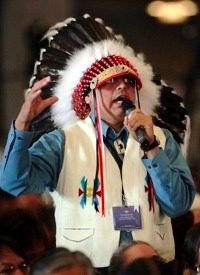
President Barack Obama on November 5 met with Native American tribal leaders at what was dubbed the White House Tribal Nations Conference. The administration invited representatives from the 564 federally recognized tribes, and leaders from almost 400 tribes showed up.
A gathering of this kind has not taken place since 1994. The conference comes at a time when some Native Americans are fighting a legal battle with the federal government over land royalties.
President Obama portrayed himself as someone who knows what it feels like to be an “outsider.” “Few have been more marginalized and ignored by Washington for as long as Native Americans, our first Americans,” he said. “I know what it means to feel ignored and forgotten, and what it means to struggle. So you will not be forgotten as long as I’m in this White House.”
Obama affirmed that Native Americans are justifiably suspicious of the federal government. Citing a history of broken treaties and unfulfilled promises, he stated, “You were told your lands, your religion, your cultures, your languages were not yours to keep.”
Trying to indicate that things will be different under his administration, Obama pointed to how much of his $787-billion stimulus package was directed toward Native Americans. Job-creation efforts received $100 million; assorted college and school projects were given almost $500 million; and the Indian Health Service got $500 million.
The president also brought up his fulfillment of campaign promises to host the summit and to include Native Americans in his administration. Kimberly Teehee, senior adviser for Indian issues, is a Cherokee, and Larry EchoHawk, Assistant Interior Secretary for Indian Affairs, is from the Pawnee tribe.
Obama’s overtures were generally well received. He issued an executive order requiring his Cabinet members to put forth plans on consulting Indian tribes, and he promised to keep Native Americans in mind when implementing education and healthcare programs. President Clinton had put forth a similar order, but little was done to follow through with it, so tribal leaders are hoping for better from Obama.
“We respect you as a man of your word,” declared Jefferson Keel of the National Congress of American Indians. “It’s truly a beginning,” remarked Theresa Two Bulls, the Oglala Sioux Tribe president. “I feel in my heart, there’s going to be many more meetings like this.”
It is understandable that tribal leaders would look forward to more meetings and more federal money, but they would do well to beware government officials bearing gifts. What the federal government subsidizes, it controls just as surely as if it were sending in the cavalry. Native Americans, like any other Americans, will find the greatest degree of liberty when they forget about Uncle Sam’s compliance-inducing bribes.
Photo: AP Images



